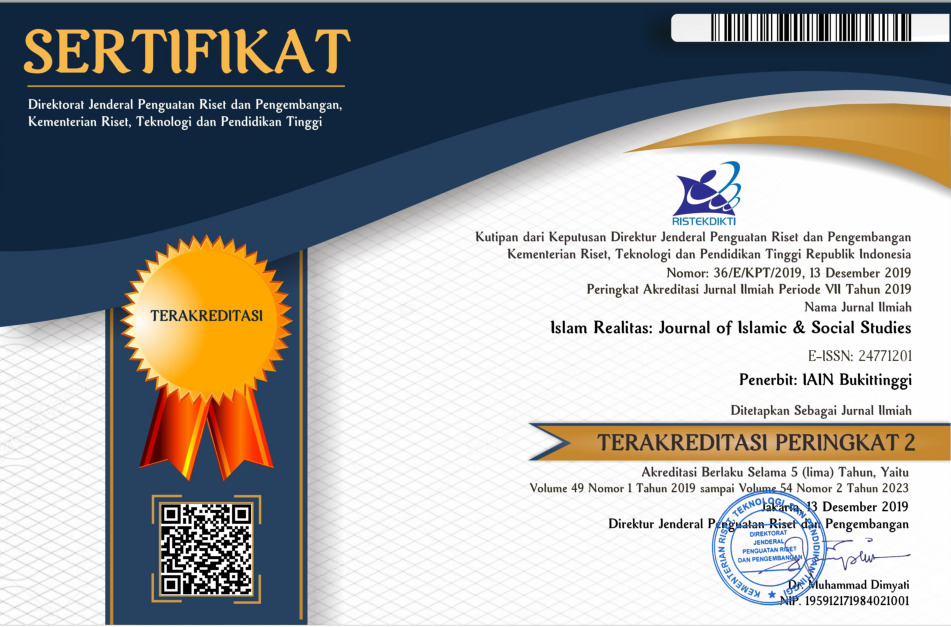Islamic Law and Gender: The Collapse of the Oligarchical-Patriarchal Culture in the Konawe Region of Southeast Sulawesi
Downloads
This article focuses on the efforts of women in the Konawe Region of Southeast Sulawesi who seek to gain an egalitarian position in the midst of oligarchical-patriarchal culture. Divorce claims as a trend of regional social become the main discourse on the dynamics of marriage law – in this context of Islamic law perspective. It is ordinarily for this research to use a qualitative approach aimed at forming substantive theories based on the concept of empirical data. The informants of this article were determined using a purposive technique, data collection techniques using in-depth interviews and participant observation, and the interactive model of Miles and Hubermann was used as a data analysis model. This research conclusively found that the power of oligarchic-patriarchal culture lies and legitimized by the interpretation of Islamic religious texts from the Qur’an and Sunnah. This effort also appears massive in the form of "rebellious" actions such as divorce to form an asymmetrical culture. This research examined this pattern in terms of asymmetric gender, namely the movement egalitarian of women who are incompatible with the ideals of male superiority in patriarchal-culture religion.
Artikel ini fokus pada upaya perempuan masyarakat Daerah Konawe Sulawesi Tenggara yang berusaha mendapatkan posisi egaliter di tengah budaya oligarkis-patriarkis. Gugat cerai sebagai tren kemasyarakatan daerah tersebut menjadi diskursus utama dinamika hukum pernikahan –dalam konteks ini perspektif hukum Islam. Lazim apabila riset ini menggunakan pendekatan kualitatif yang ditujukan pada pembentukan teori substantif berdasarkan konsep data empiris. Informan artikel ini ditentukan dengan teknik purposive, teknik pengumpulkan data menggunakan wawancara mendalam dan observasi partisipan, dan model interaktif Miles dan Hubermann dijadikan sebagai model analisis data. Riset ini secara konklutif menemukan, keperkasaan budaya oligarkis-patriarkis ada serta dilegitimasi oleh penafsiran terhadap teks-teks keagamaan Islam dari Qur’an dan Sunnah. Upaya ini pun masif muncul dalam bentuk tindakan “memberontak†seperti gugat cerai hingga membentuk budaya asimetris. Riset ini mengistilahkan pola tersebut dengan istilah gender asimetris, yaitu gerakan egaliter kaum perempuan yang tidak kesesuaian dengan cita superioritas laki-laki di budaya patriarkis-religius
Books
Azizy, A. Qodri, Membangun Fondasi Ekonomi Umat: Meneropong Prospek Berkembangnya Ekonomi Islam (Yogyakarta: Pustaka Pelajar, 2004).
Campo, Juan E., Encyclopedia of Islam (New York: Facts On Fire, Inc., 2009).
Dahlen, Ashk P., Islamic Law, Epistemology and Modernity: Legal Philosophy in Contemporary Iran (New York: Routledge, 2003).
Hassan, Ahmad, The Principles of Islamic Jurisprudence: The Command of The Syari’ah and Juridical Norm (New Delhi: Adam Publisher, 1994).
Hooker, M. B. & Virginia Hooker, Sharia, in Greg Fealy & Virginia Hooker (ed.), Voices of Islam In Southeast Asia: A Contemporary Sourcebook (Singapore: ISEAS, 2006).
Kamali, Mohammad Hashim, Shari’ah Law: An Introduction (Oxford: A Oneworld Book, 2008).
Kheirabadi, Masoud, Religions of the World: Islam (Philadelphia: Chelsea House Publishers, 2004).
Muhaimin, (ed.al.), Studi Islam: Dalam Ragam Dimensi & Pendekatan (Jakarta: Prenada Media, 2012).
Nurmila, Nina, Women, Islam and Everyday Life: Renegotiating Polygamy in Indonesia (London: Routledge, 2009).
Rachman, Budhy Munawar- (ed.al.), Kontekstualisasi Doktrin Islam dalam Sejarah (Jakarta: Paramadina, 1994).
Sukardja, Ahmad, ‘Pendahuluan’, in Taufik Abdullah, et.al., Ensiklopedi Tematis Dunia Islam: Ajaran (Jakarta: PT. Ichtiar Baru Van Hoeve, 2002).
Journals
Abbasi, Muhammad Zubair, ‘Islamic Law and Social Change: An Insight into the Making of Anglo-Muhammadan Law’, Journal of Islamic Studies, 25. 3 (2014), 325-349.
Abdullah, Ru’fah & Tata Setiana, ‘Prinsip-Prinsip Keadilan Wanita dalam Islam: Sebuah Kajian Pra-Nikah’, Jurnal Bimas Islam, 9. 2 (2016), 371-400.
Adisa, Toyin Ajibade, ‘Mind Your Attitude: The Impact of Patriarchy on Women’s Workplace Behaviour’, Career Development International, 25. 2 (2019), 146-164.
Al-Asyari, M. Khoirul Hadi, ‘Objektifikasi Hukum Perkawinan Islam di Indonesia Perspektif Maqashid Syar’iyyah: Upaya dari Integrasi Keilmuan Keislaman’, Yudisia: Jurnal Pemikiran Hukum dan Hukum Islam, 7.1 (2016), 199-237.
Al-Krenawi, Alean, ‘A Study of Psychological Symptoms, Family Function, Marital and Life Satisfactions of Polygamous and Monogamous Women: The Palestinian Case’, International Journal of Social Psychiatry, 58. 1 (2012), 79-86.
Bohorquez, Ana Maria Iregui, ‘Domestic Violence Against Rural Women in Colombia: The Role of Labor Income’, Journal Feminist Economics, 25. 2 (2019), 1-27.
Campana, Juan Carlos, ‘Gender Norms and the Gender Distribution of Total Work in Latin American Households’, Journal Feminist Economics, 24. 1 (2018), 35-62.
Devika, J., ‘Women’s Labour, Patriarchy and Feminism in Twenty-First Century Kerala: Reflections on the Glocal Present’, Review of Development and Change, 24. 1 (2019), 79-99.
Duderija, Adis, ‘Contemporary Muslim Male Reformist Thought and Gender Equality Affirmative Interpretations of Islam’, Feminist Theology, 28. 2 (2020), 161-181.
Dupret, Baudouin, ‘Filling Gaps in Legislation: The Use of Fiqh by Contemporary Courts in Morocco, Egypt, and Indonesia’, Islamic Law and Society, 26. 4 (2019), 405-436.
Fisher, Daren & Jacqueline G. Lee, ‘Testing The Universality of the Gender Equality-Peace Thesis: The Influence of Increased Gender Equality on Terrorism in Turkey’, Women & Criminal Justice, 29. 4-5 (2019), 242-265.
Gabara, Rawaa el-Ayoubi, ‘Islamic Law and Modernity’, Oxford Journal of Law and Religion, 6. 2 (2017), 323-346.
Husain, Rahmin T. ‘Polygamy in The Perspective of Hadith: Justice and Equality among Wives in a Polygamy Practice’, Madania, 23. 1 (2019), 93-104.
Ibiloglu, Aslihan Okan, ‘Negative Effects of Polygamy on Family Members in the Province of Diyarbakir, Turkey’, Cukurova Medical Journal, 43. 1 (2018), 982-988.
Kumari, Fatrawati, ‘Agama dan Kekerasan Terhadap Perempuan: Analisis Gender dan Filsafat Taoisme Islam’, Jurnal Ilmiah Ilmu Ushuluddin, 10. 1 (2011), 153-165.
Muslimin, JM., ‘Law and Culture: ‘Urf as a Substance of Islam Nusantara as Reflected in Indonesian Religious Court Decisions’, in Proceedings of the International Conference on Culture and Language in Southeast Asia (ICCLAS 2017), 153-156.
Nurhadi, ‘Maqashid Syari’ah Khulu’ dalam Hukum Pernikahan’, Jurnal Diskursus Islam, 7. 2 (2019), 252-269.
Nurmila, Nina, ‘Pengaruh Budaya Patriarki terhadap Pemahaman Agama dan Pembentukan Budaya’, Karsa: Journal of Social and Islamic Culture, 23. 1 (2015), 1-16.
---------, ‘Polygamous Marriages in Indonesia and Their Impacts on Women’s Access to Income and Property’, al-Jami’ah: Journal of Islamic Studies, 54. 2 (2016), 427-446.
Perales, Francisco & Gary Bouma, ‘Religion, Religiosity and Patriarchal Gender Beliefs: Understanding the Australian Experience’, Journal of Sociology, 55. 2 (2019), 1-19.
Rijal, Syamsul & Umiarso, ‘Sex Workers’ Religiosity and Faith in God: Case Study on “Ayam Kampus†in East Java, Indonesia’, Kalam, 12. 2 (2018), 257-282.
Rohmaniyah, Inayah, ‘Gender dan Konstruksi Perempuan dalam Agama’, Jurnal Studi Ilmu-Ilmu al-Qur’an dan Hadis, 10. 2 (2009), 207-230.
Roibin, ‘Agama dan Budaya: Relasi Konfrontatif atau Kompromistik?’, Jurnal Hukum dan Syariah, 1. 1 (2010), 1-7.
Rokhmad, Abu & Sulistiyono Susilo, ‘Conceptualizing Authority of The Legalization of Indonesian Women’s Right in Islamic Family Law’, Journal of Indonesia Islam, 11. 2 (2017), 489-508.
Shuaib, Farid Surfian, ‘Administration of Islamic Law and Human Rights: The Basis and Its Trajectory in Malaysia’, al-Jami’ah: Journal of Islamic Studies, 56. 2 (2018), 281-304.
Sudarso, ‘Gender, Relion and Patriarchy: The Educational Discrimination of Coastal Madurese Women, East Java’, Journal International Women’s Studies, 20. 9 (2019), 2-12.
Takim, Liyakat, ‘Custom as a Legal Principle of Legislation for Shi’i Law’, Studies in Religion, 47. 4 (2018), 1-19.
Taliaferro, Karen, ‘Ibnu Rushd and Natural Law: Mediating Human and Divine Law’, Journal of Islamic Studies, 28. 1 (2017), 1-27.
Thobejane, Tsoaledi Daniel & Takayindisa Flora, ‘An Exploration of Polygamous Marriages: A Worldview’, Mediterranean Journal of Social Sciences, 5.27 (2014), 1058-1066.
Tlaiss, Hayfaa A. & Saleema Kauser, ‘Entrepreneurial Leadership, Patriarchy, Gender, and Identity in the Arab World: Lebanon in Focus’, Journal of Small Business Management, 57. 2 (2019), 517-537.
Wajiran, ‘Polygamy and Muslim Women in Contemporary Indonesia Literature’, Humaniora, 30. 3 (2018), 291-304.
Warits, Abd., ‘Artikulasi Politik Perempuan Madura: Studi atas Hambatan Kultural dan Tafsir Agama pada Partisipasi Politik Perempuan di Sumenep’, Karsa: Journal of Social and Islamic Culture, 19. 2 (2011), 183-199.
Winkel, Heidemarie, ‘Religious Cultures and Gender Cultures: Tracing Gender Differences Across Religious Cultures’, Journal of Contemporary Religion, 34. 2 (2019), 241-251.
Wood, Hannelie J., ‘Gender Inequality: The Problem of Harmful, Patriarchal, Traditional and Cultural Gender Practice in The Church’, HTS Theological Studies, 75. 1 (2019), 1-8.
Authors who publish with this journal agree to the following terms:
- Authors retain copyright and grant the journal right of first publication with the work simultaneously licensed under a Creative Commons Attribution License that allows others to share the work with an acknowledgment of the work's authorship and initial publication in this journal.
- Authors are able to enter into separate, additional contractual arrangements for the non-exclusive distribution of the journal's published version of the work (e.g., post it to an institutional repository or publish it in a book), with an acknowledgment of its initial publication in this journal.
- Authors are permitted and encouraged to post their work online (e.g., in institutional repositories or on their website) prior to and during the submission process, as it can lead to productive exchanges, as well as earlier and greater citation of published work (See The Effect of Open Access).









